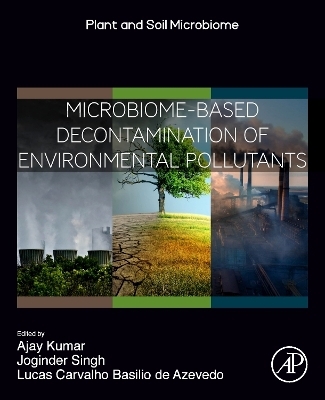
Microbiome-Based Decontamination of Environmental Pollutants
Academic Press Inc (Verlag)
978-0-443-21781-4 (ISBN)
Dr. Ajay Kumar is currently working as an assistant professor at Amity Institute of Biotechnology, Amity University, Noida, India. Dr. Kumar recently completed his tenure as a visiting scientist from Agriculture Research Organization, Volcani Center, Israel. He has published more than 200 research, review articles, and book chapters in international and national journals. He serves as an associate editor for Frontiers in Microbiology, BMC Microbiology and as guest editor for various journals such as Plants, Microorganisms, and Sustainability. Dr. Kumar has also edited more than 40 books with the leading publishers such as Elsevier, Springer, and Wiley. Dr. Kumar’s research experience is in the field of plant–microbe interactions, postharvest management, cyanobacterial biology, and so on Prof. Joginder Singh is a Professor at the Department of Botany, Nagaland University, Lumami, Nagaland, India. Previously, he worked as a Professor in the School of Bioengineering and Biosciences, Lovely Professional University and also as a Young Scientist at Microbial Biotechnology and Biofertilizer Laboratory, Department of Botany, Jai Narain Vyas University on a research project funded by the Department of Science and Technology, Government of India. He is an active member of various scientific societies and organizations, including the Association of Microbiologists of India, the Indian Society of Salinity Research Scientists, the Indian Society for Radiation Biology, and the European Federation of Biotechnology. He has published extensively with Elsevier and Springer both in journals and books. He serves as a reviewer for many prestigious journals, including Current Research in Engineering, Science and Technology; Journal of Cleaner Production; Science of the Total Environment; Environmental Monitoring and Assessment; Pedosphere; Soil and Sediment Contamination; Symbiosis; International Journal of Phytoremediation; Ecotoxicology and Environmental Safety; Annals of Agricultural Sciences; and Annals of the Brazilian Academy of Sciences. Dr. Lucas C. B. Azevedo holds a degree in Agronomy (State University of Londrina, Brazil), MSc in Soil Science (Federal University of Lavras, Brazil), and PhD in Soil Science and Plant Nutrition (University of São Paulo, Brazil), which included an internship at Kansas State University, USA. He was named Assistant Professor at the Federal Institute of Goiás State, Brazil teaching Soil and Environmental Microbiology classes. He was named Adjunct Professor at the Institute of Agricultural Sciences of the Federal University of Uberlândia and is currently Associate Professor teaching the subjects of Soil Microbiology, Bioremediation, and Introduction to Soil Science to undergraduate courses of Agronomy and Environmental Engineering. For graduate courses in Environmental Quality and Agronomy, he has taught Soil Ecology classes. As a researcher, he has studied and collaborated in investigations of soil quality indicators soil microbiology soil contamination and remediation and plant growth promoting microorganisms
1. Bioremediation: using indigenous microorganisms to clean up the environment
2. Significance, mechanisms and environmental implications of microbe mediated remediation
3. Microbiome immobilized sorbents: status and future aspects
4. Understanding and Designing the Strategies for the Microbe-Mediated Remediation of Environmental Contaminants Using Omics Approaches
5. Microbial Indicators for Monitoring Pollution and Bioremediation
6. Bioremediation of high molecular weight polycyclic aromatic hydrocarbons
7. Biochemical approach in microbial degradation organic contaminants
8. Microbial Bioremediation of Metal and radionuclides: Approaches and Advancement
9. Microbe assisted remediation of xenobiotics: A sustainable solution
10. Importance of microbial surfactants in heavy metal remediation
11. Role of Microbial biofilms in bioremediation: Current Perspectives
12. Applications of Microbial extracellular polysaccharides in Bioremediation
13. Exploring the potential of cyanobacteria in contamination management
14. Potential use of Endophytic microbe in environment contamination management
15. Environmental antibiotics and resistance genes as emerging contaminants: and their bioremediation
16. Synthetic Microbial Consortia: utilization in environment sustainability
17. Microbiological risk assessment of food OR genetically modified organisms
| Erscheinungsdatum | 13.04.2024 |
|---|---|
| Reihe/Serie | Plant and Soil Microbiome |
| Verlagsort | San Diego |
| Sprache | englisch |
| Maße | 191 x 235 mm |
| Gewicht | 450 g |
| Themenwelt | Naturwissenschaften ► Biologie ► Botanik |
| Naturwissenschaften ► Biologie ► Ökologie / Naturschutz | |
| Naturwissenschaften ► Geowissenschaften ► Geologie | |
| ISBN-10 | 0-443-21781-5 / 0443217815 |
| ISBN-13 | 978-0-443-21781-4 / 9780443217814 |
| Zustand | Neuware |
| Informationen gemäß Produktsicherheitsverordnung (GPSR) | |
| Haben Sie eine Frage zum Produkt? |
aus dem Bereich


